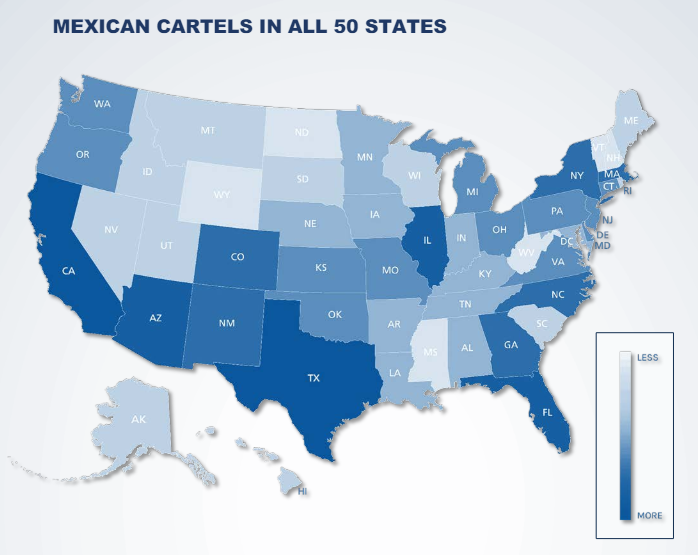Noem claims cartels are using SD Indian reservations as 'haven' for distributing drugs
- Oops!Something went wrong.Please try again later.
A press conference held by Gov. Kristi Noem, regarding the U.S.-Mexico border and cartels on South Dakota's nine Indian reservations, did not glean much more information than what she has already publicly stated.
But Noem did talk about the issue of cartel influence in a broader sense than before.
Noem, citing data from the Drug Enforcement Agency, told members of the media Friday cartels are operating in every single state in the U.S.
The second-term governor spent part of the 51-minute press conference hammering the state's Native American tribal leaders for banning her over comments she made earlier this year about the presence of cartels on the reservations. She emphasized her claim Mexican cartels are using South Dakota's Indian lands as "safe havens" to distribute drugs in the state.
"These cartels and their affiliates are finding a haven in our tribal reservation areas and the crimes that are being committed there have increased so dramatically in the last several years," Noem said.
So far, eight of the state's nine Native American tribes have endorsed the banishment of Noem after she told lawmakers during a speech tribal leaders are "personally benefiting" from the cartels.
Noem told members of the media the DEA report would be shared during the press conference, but copies of the report were not immediately made available.
The DEA released May 9 its annual National Drug Threat Assessment, which analyzes illicit drug threats and trafficking trends in the U.S.

In the report, the intensity of the presence of Mexican cartels in South Dakota is on the lower end of the spectrum compared to Iowa, Minnesota, Nebraska, and less than what's apparent in Texas, Arizona and other border states.
"Those failed border policies of President Biden have turned South Dakota into a border state, and we've seen the effects here every single day with the crime and the violence that is perpetuated within our own state borders," Noem said.
Dewey County Sheriff Ash Arpan, a member of the Cheyenne River Sioux Tribe, was invited to speak to media during the press conference. He related the severity of the drug problems on the reservations by speaking about an incident when he was assaulted in the line of duty while serving as a tribal police officer.
"I was stabbed by an individual who was under the influence of drugs, and so I got to see the impact to my family, being a victim and being placed in that situation," Arpan said. "So, when we talk about the drug issues on reservations … I want to see us have more solutions and less focus on politics."
The Argus Leader spoke to Arpan after the press conference, and he elaborated the responsibility of that is on the state as much as it is the tribes.
"I try to think positively about this," Arpan said. "We should be able to move forward together."
Arpan told the Argus Leader he was assaulted in 2002. He clarified and said he was originally handling a call involving an elderly woman, and he was stabbed by a person he said was on drugs while responding to the incident.
"That's why I have a scar near my eye," Arpan said. "It affects you and your family, and you don't want it to."
Arpan couldn't say there were necessarily more drugs coming onto the state's tribal reservations, but he explained the drugs law enforcement officers are coming into contact these days, like fentanyl, are "harder" than most illicit substances used used previously.
The press conference comes after Noem announced she traveled Thursday to the U.S.-Mexico border with Department of Tribal Relations Secretary David Flute, newly hired Tribal Law Enforcement Liaison Algin Young, Sen. Erin Tobin (R-Winner), Sen. Mike Walsh (R-Sioux Falls), and Rep. James Wangsness (R-Miller).
There, the entourage met South Dakota National Guard members and viewed the situation.
According to monthly U.S. Customs and Border Protection data, migrant encounters — this accounts for temporary apprehensions by border authorities, as well as expulsions from the U.S. — in January through April have significantly dropped compared to December 2023, where enforcement encounters peaked at 301,980. As of April 2024, there have been 179,725, less than the 211,992 encounters in April 2023 and the 235,785 encounters in April 2022.
She also used the moment to berate South Dakota media for allegedly not covering the cartel situation on the reservations, and to promote an upcoming TruBlu documentary by former "How To Catch A Predator" host Chris Hansen.
Media across the state, and nationally, have covered the issue of drugs and allegations of cartels on the reservations, along with the role politics has played in the issue, in a variety of ways for months.
Correction: A previous version of this story misstated why Noem was berating the media. The story has been updated to reflect this change.
This article originally appeared on Sioux Falls Argus Leader: Noem: Cartels use Indian reservations as 'haven' for drug trafficking

